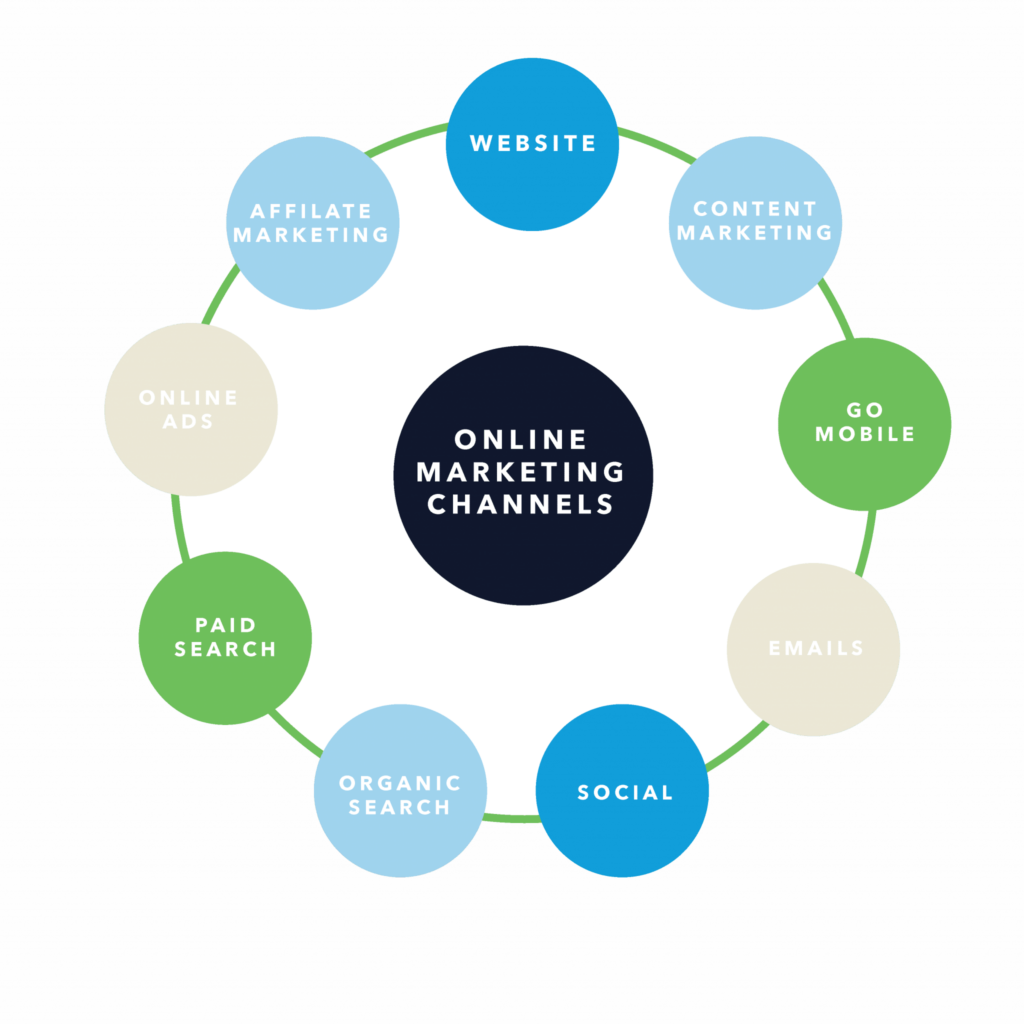It can be hard to know which are the best marketing channels for your ecommerce business, but once you know the front-runners, you’ll be able to use them to maximize your brand’s reach. Building your online presence is absolutely critical in 2023, and the best way to do this is to catch your audience on all their favorite platforms so that your store becomes their go-to.
So how do you know which channels to use? While it depends on your target audience and bank of real-time data, there are eight key marketing channels that every ecommerce business should explore.
The 8 Best Marketing Channels for Ecommerce

1. Your Website
Perhaps the most important marketing channel for ecommerce is, of course, your website. It serves as your identity, your ecommerce platform, and as your store of user-focused content.
Your website is where consumers will really learn about your product – and if you neglect it, it won’t be long before you see a drop in your ecommerce conversion rates.
You see, it’s not just about having a website that makes it a prime marketing channel; it’s about how you use it. Optimizing your ecommerce site for SEO (search engine optimization) is the first crucial step to take if you want to bring in organic traffic from search engines, but also consider how you can optimize it for the user experience and how you can use it to guide users through the ecommerce conversion funnel.
Your website is also where you can get creative with content and really use it to engage your audience. This is a form of content marketing, another important marketing channel for ecommerce.
2. Maximizing Content Marketing
Content marketing isn’t only a great way to rise up the search engine results pages (SERPs), it’s also one of your greatest weapons in attracting site visitors, and then converting them into customers. In fact, we believe it’s one of the best marketing channels for ecommerce there is in terms of both ROI and building customer engagement.
Creating pieces of content that are thoughtful, informative, and tailored to your audience helps to establish your brand as an authority within your industry. In this way, content marketing can build trust, credibility, and even rapport among visitors.
Ecommerce content marketing is its own channel that works slightly differently: not only should it be used to boost site traffic, it should also be constructed in a way that drives conversions. Whatever your business, your content must be valuable or helpful to your target audience if you want them to be persuaded into buying. Good examples of ecommerce content include:
- How-to videos and articles that explain how your product or service works
- Video content that answers FAQs, introduce your team, or act as an instructional guide
- Interactive quizzes that identify users’ needs and helps them find the right product
- Blogs about the latest industry news or exciting developments in your company
- Pieces of brand journalism, like behind-the-scenes content, that are humanizing and relatable
- 360 product viewers that give users a near-tangible experience of your product
- Testimonials, customer reviews, or success stories about your product
3. Don’t Forget to Go Mobile
A commonly overlooked marketing channel for ecommerce is mobile ecommerce, or m-commerce, which has been on the rise in this booming digital age. In fact, 78% of mobile users who search for local business information end up making a purchase. That makes it more important than ever to make sure your ecommerce store is optimized for and responsive to a wide range of mobile devices, from smartphones to tablets. You can do this by:
- Using a design that responds and adjusts to a range of screen sizes and aspect ratios
- Ensuring your check-out process is compatible and easy to use with mobile devices
- Frequently checking your site speed and how fast your site loads on various smartphones
- Making sure that things like forms and other content are easy to navigate on a mobile
You can also capitalize on the mobile ecommerce channel by sending out personalized offers, messages and discounts based on where your site visitors are geographically. This is possible because mobile users usually have their GPS switched on, providing you invaluable data about where and when to catch your target audience.
Using location information to customize offers is a great way to get someone to buy there and then. Since over 60% of email engagement comes from mobile devices, you can also integrate this tactic with email marketing to really drive conversions.
4. Email Marketing
Speaking of which, email marketing is a critical part of any ecommerce marketing strategy because it has a bigger chance of success than any other marketing channel. In fact, using email marketing has been proven to yield higher conversion rates and ROIs – and if you don’t believe us, here are some eye-opening statistics about email marketing and its effectiveness.
The reason email is such a lucrative marketing channel for ecommerce is because of consenting subscribers. Any offers, promos, or product updates from you are more likely to be acted on by people who have willingly decided to be on your email list. When a potential customer does this, they’re showing that they’re already interested in what you’re offering and are expecting to hear more. This makes them more receptive to your marketing material because they already have an affinity with your brand.
Email marketing is also important in ecommerce because they allow you to build relationships with your customers. You can do this either by personalizing your emails with users’ names, sending out exclusive discounts to thank them for their subscription, or even just automating thoughtful holiday greetings or birthday messages. This level of connectivity isn’t possible with most other marketing channels, which is why emails can be so successful at driving traffic and conversions.
5. Let’s Get Social
Social media channels are among the most interactive and powerful ecommerce marketing channels that you can use. This is because social media marketing gives you the opportunity to interact with your audience directly and in real time. You can do this by:
- Responding to comments and private messages
- Conducting polls, Q&As, or livestreams
- Commenting on target consumers’ posts
- Sharing relevant posts from leads or similar businesses
Put simply, your target audience are more likely to be persuaded to buy from you if they can easily interact with your business. When deciding on which platform to use, do some research using analytics to find out which one your ideal consumers use the most; you don’t want to waste any effort or resources on social media platforms that are used by the wrong audience.
You should also consider which platform will best accommodate your kinds of posts. For example, if you’re a video marketing agency, YouTube is likely the best platform for you to use. If you’re selling tangible products to younger audiences, Instagram or TikTok will probably better suit your needs. On the opposite end of the spectrum, B2B businesses tend to find more success with platforms like Linkedin or Twitter. These are all important things to consider if you want to maximize the potential of social media marketing channels.
6. Organic Search
Organic search involves the use of various keywords, keyword phrases, or backlinks that allow your target audience to find your website on search engines. Ecommerce marketing channels that drive organic traffic are valuable because they attract site visitors who are already using keywords to find products or businesses that are similar to yours. This not only means they’re already interested in your kind of product, but also that they’re already in the mood to buy – and you should capitalize on this.
Get your ecommerce business to rank better in organic searches by ensuring that your site is optimized for search engines. There are many different SEO techniques you can use to do this, from regularly updating your old content with relevant keywords to conducting a site-wide technical SEO audit.
7. Paid Search and Online Ads
Compared to organic search, paid search is a more targeted kind of marketing channel for ecommerce. Running paid ads to increase search traffic is particularly useful if you’re just starting out, or if your brand is still relatively unknown online – but it’s also incredibly effective for established businesses, too.
Paid ads are also an effective ecommerce marketing tactic because they allow you to identify parameters like age, gender, location, or online behavior in order to reach your target audience. Types of paid ads can include social media ads, PPC (pay-per-click) campaigns, and Google Ads.
8. Affiliate Marketing
Affiliate marketing is the method by which a business is promoted or a product is sold by another party that’s independent from the business. An entity that acts as an affiliate agent can be an individual person, like a social media influencer, or a company that is related to your field.
With affiliate marketing, a commission is paid every time a product is sold. While this may not sound budget-friendly, affiliate marketing is an excellent ecommerce marketing channel because it reinforces how trustworthy and valuable your brand is: people are more likely to buy from you if you’re being endorsed by a reputable source that they already trust. It also opens up a new and ready-made audience.



